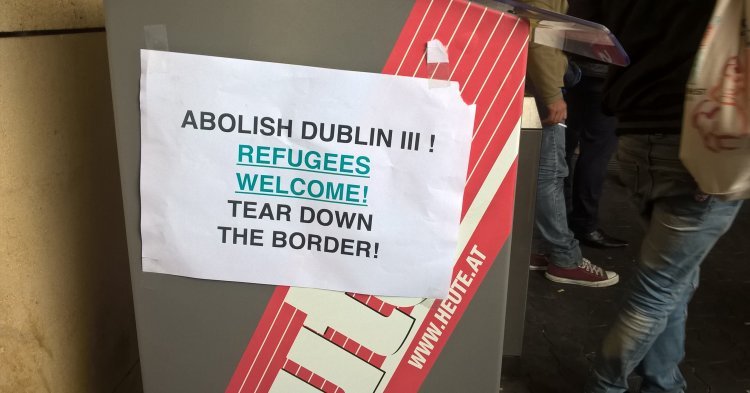Tales of death on the Mediterranean are not new, with an increasing number of people drowning as they flee to Europe each year. Just days after the grim discovery of the suffocated bodies of 71 migrants in a lorry on an Austrian motorway, Europe was forced to face reality of refugees’ struggle. Since the crisis escalated three weeks ago, I have been spending time in Vienna’s Westbahnhof where most of the refugees are attempting to pass through in an attempt to get to grips with the situation in Europe.
Life at Westbahnhof
The Viennese train station has taken on the appearance of refugee camp in recent weeks. Where people once checked timetables, a children’s play area has been set up. Ärzte ohne Grenzen (doctors without borders) serve as a medical service to the new inhabitants and a nearby storage building has been hastily transformed into a makeshift larder to house donations. Volunteers dash around, attempting to provide assistance and bring a little order back into the lives of the migrants and the heavy police presence is a solemn reminder of the gravity of the situation.
In a matter of days, Westbahnhof went from being a bustling city train station to a stark symbol of the worst refugee crisis since the Second World War.
Speaking to the refugees at the train station, it becomes increasingly clear why they are here and why they have chanced such a dangerous trip. The majority of those I have spoken to are from Syria. They explained that they have been forced to flee areas such as Damascus to escape conflicts, some with their family or friends. Many, however, are alone.
Once in Europe, their journey was still far from easy. They have been met with hostility and face obstacles at every corner - I met one man who had been stranded in Westbahnof for four days, relying only on donations from the public to survive.
To say that their futures remain uncertain would be an understatement.
Receptions from EU states
As the number of migrants entering the continent has increased, so too has hostility towards them. Scenes of violent clashes with police and border guards in Croatia, Hungary, Slovenia, Romania and Serbia have become increasingly common as governments attempt to stem the flow of people moving through into Austrian and then Germany.
In many areas, border controls have been brought into place as an emergency measure permitted under the Schengen agreement. This has been met with uproar from areas of Europe that remain sympathetic to the refugees’ plight and has divided politicians. However, not all receptions have been resentful. As stories of hostility towards refugees began flooding the headlines, so too did accounts of grassroots support for migrants.
A spokesman for Caritas (a humanitarian charity currently providing aid at Vienna’s Westbahnhof) claimed that they had been able to provide assistance to the 6,000 migrants that passed through the station every day with just donations from the public. The shelves of nearby supermarkets lay empty for some time due to the volume of food, water and supplies being bought and donated by local people. Many volunteers have crossed national borders themselves to lend a hand at Vienna’s train stations and drove across countries to ferry migrants in their cars.
This compassion has been echoed across the continent, with news of people donating, volunteering and even hosting refugees springing up from Kos to Calais. So if many citizens happily welcome the refugees, why then are states more reluctant?
Concerns of EU countries: Economics
One of the key concerns of EU member states is the economic ramifications of accommodating large numbers of migrants.
Of the migrants I spoke to at Westbahnhof, all told me that they would ideally like to travel and be registered in Germany. However, Germany cited its inability to cope with the expected 800,000 migrants it will receive this year when it announced its new border measures on Monday. Federal Minister of Interior, Thomas de Maiziere, called upon other European states to take up more responsibility as the country reached the “limit of its capabilities”.
Concerns have arisen amongst national politicians over the cost of providing refuge to migrants, prompting many to implement special measures such as border controls in recent days. Similarly, many citizens are expressing unease over the impact of such a population growth upon state welfare systems and pressure is on national leaders to address these concerns.
Concerns of EU countries: Culture
For many European countries, the refugee crisis is also fuelling internal turmoil. Populist parties such as the United Kingdom Independence Party and the Freiheitliche Partei Österreichs (Freedom Party of Austria) have seen received large increases in support since the crisis came to popular attention due to their strong anti-immigration policies. Such parties have capitalised on the idea of refugees as a threat to traditional culture and used to strengthen their hold over the electorate. As well as combining economic fears into their manifestos, populist parties sell the idea of an incompatibility between native Europeans and those coming from outside of the EU. In particular, the threat of ISIS soldiers being “smuggled” into Europe amongst genuine refugees has been used to create a climate of fear and mistrust of migrants within European states.
The migrant crisis has therefore generated enough controversy to dramatically influence the outcomes of national elections.
Concerns of EU countries: division of the Union
As well as creating rifts within countries, the migrant crisis has also driven a wedge between EU states. Before trains crossing the Austro-German border were halted and Germany’s suspension of Schengan brought into place, most of those I spoke to were destined for Berlin, Frankfurt or Munich.
The decision of most migrants to head towards Germany or Sweden has caused the nations to call upon other EU states to split the burden and many politicians advocating a revised quota system. As well as this, tensions between countries near to the beginning of the migrants’ European trek are heightening as a game of refugee pass-the-parcel is played. Hungary in particular has fallen under criticism following its harsh treatment of migrants and building physical barriers alongside its neighbouring countries.
With no agreement in sight, the issue of how to cope with the migrant crisis continues to divide the continent.
The coming weeks, months and indeed years will see drastic changes being brought about within Europe. Migrants’ lives are ever more uncertain and as politicians struggle to come to an agreement, interstate relations will be put to the test, the future of Schengen will hang in the balance as indeed will the future of the European Union.


Follow the comments: |
|
